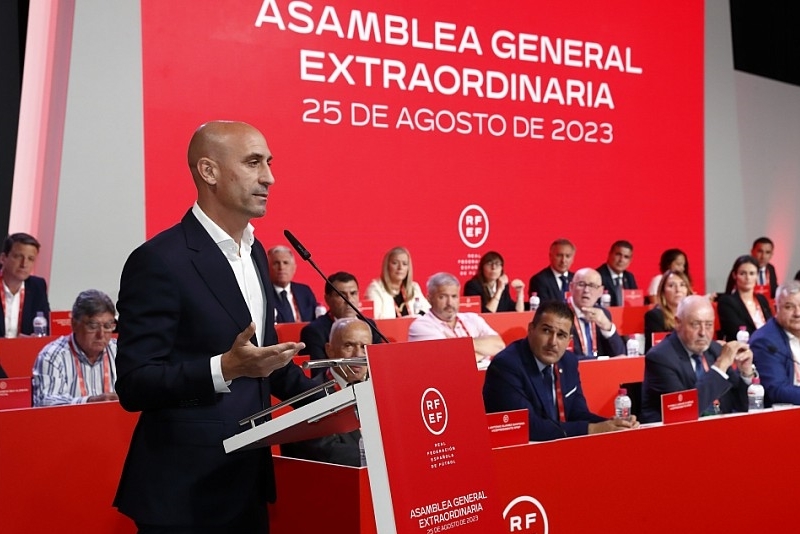First, Spain’s Women’s World Cup winners said they would no longer play for their country as they fight sexism in the nation's soccer federation. Now, Spain’s women’s league players are on strike and calling for what they call a dignified minimum wage.
The Liga F — Spain's women’s league — was supposed to kick off its second season on Friday, but instead its players are striking for the first two rounds of games.
WATCH ANYTIME FOR FREE
>Stream NBC10 Boston news for free, 24/7, wherever you are. |
The strike comes with the nation immersed in the scandal caused by soccer federation president Luis Rubiales when he kissed a Spain player on the lips without her consent during the Aug. 20 awards ceremony in Sydney, Australia after Spain had beaten England in the final.
Rubiales' conduct caused outrage in Spain. It also has drawn attention away from the greatest achievement in the history of Spanish women’s soccer, which has undergone spectacular growth over the last decade but still is fighting for a pay raise that, if granted, would still be just a fraction of what's paid in the men's La Liga.
Get updates on what's happening in Boston to your inbox. Sign up for our >News Headlines newsletter.
The minimum salary for the women’s league is 16,000 euros ($17,400) before taxes, compared to the 182,000 euros ($197,000) guaranteed for men in La Liga.
Of 334 female players, 80 players made under 20,000 ($21,400) euros a year, while the average salary was around 40,000 euros ($42,800), according to the league.
For Keka Vega, a former player representing the AFE player’s union, the widespread condemnation of Rubiales in Spain — and abroad — has provided an ideal scenario for players' quest for a fairer shake.
“Our players consider that after the Women’s World Cup title and the worldwide attention that women’s soccer has received it was a good moment to stand up, fight for their workers’ rights, and demand that the sport received the support it needs to truly develop,” Vega told The Associated Press.
“Maybe the league does not consider this to be the best timing, but the players have considered that it was key.”
Liga F started as Spain’s first fully professional women’s league last season. Its executives are now concerned that the strike could end up tarnishing its image and lead to fans, and potential sponsors, associating the labor dispute with the Rubiales controversy.
Liga F chief executive Pedro Vilches said that strike will hurt the league just when it should be taking advantage of the increased interest in women’s soccer. To start with, missing the first two rounds will cost clubs between 800,000 to 1 million euros ($857,00-$1 million), he said.
“Winning the Women’s World Cup was an extraordinary success, which unfortunately practically nobody is talking about in Spain or the rest of the world because we are only talking about the situation of Luis Rubiales,” Vilches told the AP. “And it is true that all the focus is on the Liga F, but we have been honest and offered the maximum that we can."
Vilches said that Spanish and international companies which have shown interest in becoming new sponsors of the league are concerned with the turmoil caused by Rubiales. And he fears that could be compounded by the strike.
“There are companies . . . that have become hesitant in negotiations because they don’t want to associated with this type of scandal,” Vilches said. “And the strike does not help."
The league, led by former player and president Beatriz Álvarez, immediately demanded the resignation of Rubiales for his conduct at the Women's World Cup final, when he also grabbed his crotch in a lewd victory gesture.
“We were one of the first (sports bodies) to denounce (Rubiales), and our president has backed that up by speaking out as a question of her convictions,” Vilches said. “We are a women’s league . . . and of course we don’t want to look the other way.”
The creation of a women's league independent from the federation was a landmark moment for women's sports in the soccer-crazed country. That struggle has included other gains such as having games televised, more attention from the local sports media, and the all-powerful Real Madrid finally fielding a women's team in 2020.
Vilches argued that only Barcelona, which has won the last four domestic titles, two of the last three Champions Leagues, and has two-time Ballon d’Or winner Alexia Putellas, has a women’s team that is economically sustainable.
He said the rest are losing money for their clubs despite the growth in revenues, which reached 6 million euros ($6.4 million) for the league last season. The league said that its four clubs that only field women’s teams, and thus have no men’s team to also bring in money, also depend on government support.
Vilches also said that the league estimates that any increase to the minimum wage would lead to increases up the pay scale.
But Vega, the players' union representative, said that the unions were convinced that the clubs pay higher salaries given the extra revenues sure to come.
In addition to typical living expense, she said: "You have to eat well, you have to carry out specific medical treatments if you are injured, and do all that on 16,000 euros.”
Rubiales, who was already temporarily suspended by FIFA, was formally accused by Spanish state prosecutors of sexual assault and coercion on Friday. Now his fate is in the hands of a judge, who will decide whether the case should be investigated or shelved.
Spain’s national team players have said they won’t play again for their country “if the present leadership remains in charge.” They have yet to say if they will return after Rubiales was suspended and their unpopular coach was fired last week.
Spain is scheduled to start the Women's Nations League on Sept. 22.



